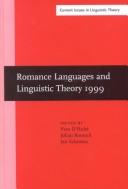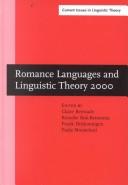| Listing 1 - 10 of 15 | << page >> |
Sort by
|
Book
Year: 2016 Publisher: Amsterdam, [Netherlands] ; Philadelphia, [Pennsylvania] : John Benjamins Publishing Company,
Abstract | Keywords | Export | Availability | Bookmark
 Loading...
Loading...Choose an application
- Reference Manager
- EndNote
- RefWorks (Direct export to RefWorks)
Book
ISBN: 9027271291 9789027271297 9789027203854 9027203857 1306070090 Year: 2013 Publisher: Amsterdam : John Benjamins Publishing Company,
Abstract | Keywords | Export | Availability | Bookmark
 Loading...
Loading...Choose an application
- Reference Manager
- EndNote
- RefWorks (Direct export to RefWorks)
Linguistics --- Romance languages --- Conferences - Meetings
Book
ISBN: 9789027210050 9027210055 9027258422 Year: 2021 Volume: 355 Publisher: Amsterdam ; Philadelphia : John Benjamins Publishing Company,
Abstract | Keywords | Export | Availability | Bookmark
 Loading...
Loading...Choose an application
- Reference Manager
- EndNote
- RefWorks (Direct export to RefWorks)
"This volume contains a selection of 18 peer-reviewed papers presented at the 31st edition of Going Romance. Phenomena found in Romance languages (European Portuguese, French, Italian, Spanish, Romanian), in Romance dialects (Cosentino, Salentino, southern Calabrese, Neapolitan, and Trevigiano), and even in creoles with a Romance lexifier (Makista and Kristang) either benefit from in-depth analyses confined to one single variety, or are subjected to comparative analysis (dialect vs standard language, dialect vs different major language(s), cross-dialectal comparison, cross-Romance comparison, and even comparison of language families). Theoretical and experimental approaches complement one another, as do diachrony and synchrony. Individually and as a whole, these contributions show how the Romance languages contribute to a better understanding of issues which are relevant in the current linguistic landscape: acquisition, n-words, ellipsis phenomena, focus and polarity, ditransitive constructions, grammaticalization theory, differential object marking, language ecology, event structure, cyclicity, passives and many more"--
Romance languages --- Langues romanes --- Romance languages. --- Romance languages - Congresses
Book
ISBN: 9789027258298 9027258295 9027210128 9789027210128 Year: 2021 Publisher: Amsterdam: John Benjamins,
Abstract | Keywords | Export | Availability | Bookmark
 Loading...
Loading...Choose an application
- Reference Manager
- EndNote
- RefWorks (Direct export to RefWorks)
"This volume contains a selection of 18 peer-reviewed papers presented at the 31st edition of Going Romance. Phenomena found in Romance languages (European Portuguese, French, Italian, Spanish, Romanian), in Romance dialects (Cosentino, Salentino, southern Calabrese, Neapolitan, and Trevigiano), and even in creoles with a Romance lexifier (Makista and Kristang) either benefit from in-depth analyses confined to one single variety, or are subjected to comparative analysis (dialect vs standard language, dialect vs different major language(s), cross-dialectal comparison, cross-Romance comparison, and even comparison of language families). Theoretical and experimental approaches complement one another, as do diachrony and synchrony. Individually and as a whole, these contributions show how the Romance languages contribute to a better understanding of issues which are relevant in the current linguistic landscape: acquisition, n-words, ellipsis phenomena, focus and polarity, ditransitive constructions, grammaticalization theory, differential object marking, language ecology, event structure, cyclicity, passives and many more"--
Romance languages --- Langues romanes --- Romance languages. --- Romance languages - Congresses --- Variation.

ISBN: 9027237298 9786613121547 1283121549 9027284393 9789027284396 9781283121545 6613121541 1588111318 9781588111319 9789027237293 Year: 2001 Volume: 221 Publisher: Amsterdam Benjamins
Abstract | Keywords | Export | Availability | Bookmark
 Loading...
Loading...Choose an application
- Reference Manager
- EndNote
- RefWorks (Direct export to RefWorks)
This volume brings together a selection of articles presented at 'Going Romance' 1999. The articles focus on current syntactic and semantic issues in various Romance languages, including Catalan, French, Italian, Spanish, Portuguese, and a number of Northern Italian dialects. A large number of articles focus on negation, which was the theme of the workshop at Going Romance 1999, but other topics investigated include Wh- in situ, free relatives, exclamatives, lexical decomposition and thematic structure, unaccusative inversion, and temporal existential constructions. Most articles are comparative in nature, relating the different syntactic and semantic properties of both Romance and non-Romance languages to principles of Universal Grammar. The theoretical frameworks adopted in the various articles are diverse, ranging from the Principles and Parameters framework to HPSG.
Romance languages --- Romaanse taalkunde --- Langues romanes --- Congresses --- Congrès

ISBN: 1283315769 9786613315762 9027275386 9789027275387 9789027275387 9781588113313 1588113310 9781283315760 9027247420 9789027247421 1588113310 9789027247421 6613315761 Year: 2002 Volume: 232 Publisher: Amsterdam Benjamins
Abstract | Keywords | Export | Availability | Bookmark
 Loading...
Loading...Choose an application
- Reference Manager
- EndNote
- RefWorks (Direct export to RefWorks)
This volume presents a selection of the best papers from the 2000 'Going Romance' conference, held in Utrecht. The papers discuss current topics in formal syntax in Romance languages.
Romance languages --- Langues romanes --- Congresses --- Congrès
Book
ISBN: 9027258422 9789027258427 9789027210050 9027210055 Year: 2021 Publisher: Amsterdam: John Benjamins,
Abstract | Keywords | Export | Availability | Bookmark
 Loading...
Loading...Choose an application
- Reference Manager
- EndNote
- RefWorks (Direct export to RefWorks)
"This volume contains a selection of 18 peer-reviewed papers presented at the 31st edition of Going Romance. Phenomena found in Romance languages (European Portuguese, French, Italian, Spanish, Romanian), in Romance dialects (Cosentino, Salentino, southern Calabrese, Neapolitan, and Trevigiano), and even in creoles with a Romance lexifier (Makista and Kristang) either benefit from in-depth analyses confined to one single variety, or are subjected to comparative analysis (dialect vs standard language, dialect vs different major language(s), cross-dialectal comparison, cross-Romance comparison, and even comparison of language families). Theoretical and experimental approaches complement one another, as do diachrony and synchrony. Individually and as a whole, these contributions show how the Romance languages contribute to a better understanding of issues which are relevant in the current linguistic landscape: acquisition, n-words, ellipsis phenomena, focus and polarity, ditransitive constructions, grammaticalization theory, differential object marking, language ecology, event structure, cyclicity, passives and many more"--
Romance languages --- Langues romanes --- Romance languages.
Book
Year: 2018 Publisher: Amsterdam ; Philadelphia : John Benjamins Publishing Company,
Abstract | Keywords | Export | Availability | Bookmark
 Loading...
Loading...Choose an application
- Reference Manager
- EndNote
- RefWorks (Direct export to RefWorks)
"In the three decades of its existence, the annual Going Romance conference has turned out to be the major European discussion forum for theoretically relevant research on Romance languages where current theoretical ideas about language in general and about Romance languages in particular are exchanged. The twenty-ninth Going Romance conference was organized by the Radboud University and took place in December 2015 in Nijmegen. The present volume contains a selection of 19 peer-reviewed articles dealing with syntax, phonology, morphology, semantics and acquisition of the Romance languages. They represent the wide range of topics at the conference and the variety of research carried out on Romance languages within theoretical linguistics and will be of interest to scholars in Romance and in general linguistics"--
Book
ISBN: 9789027203823 9789027287618 9027287619 1282897314 9781282897311 9027203822 9786612897313 6612897317 Year: 2010 Publisher: Amsterdam Benjamins
Abstract | Keywords | Export | Availability | Bookmark
 Loading...
Loading...Choose an application
- Reference Manager
- EndNote
- RefWorks (Direct export to RefWorks)
This paper pursues an analysis of verbs like Italian mordicchiare (nibble) as event-internal pluractional verbs that denote composite single events where the predicate is distributed on the fragments of one entity, and grammaticise a local form of number through the part-of relation. This opens the possibility of reading number marking in aspectual terms, whereby fragmenting is a form of modification that perturbs the mapping between event and object.
Romance languages --- Conferences - Meetings --- Linguistics
Book
ISBN: 9027203849 9789027203847 9781283895316 1283895315 9027272476 9789027272478 Year: 2012 Publisher: Amsterdam : John Benjamins Publishing Co,
Abstract | Keywords | Export | Availability | Bookmark
 Loading...
Loading...Choose an application
- Reference Manager
- EndNote
- RefWorks (Direct export to RefWorks)
The annual 'Going Romance' conference has developed into the major European discussion forum for theoretically relevant research on Romance languages where current ideas about language in general and about Romance languages in particular are tested. The twenty-fourth 'Going Romance' conference was organized by the Leiden University Centre of Linguistics (LUCL) and took place in Leiden on 9-11 December 2010. The present volume contains a selective collection of peer-reviewed articles (10 out of approximately 30 contributions) dealing with poignant issues in syntax, phonology, morphology, and semantics of the Romance languages. The innovative character of the proposals as well as the discussions of various interface issues offered by the papers contained in this volume are interesting for both Romance scholars and other linguists. Among the contributions are the papers presented by the invited speaker M. Rita Manzini and of prominent linguists such as João Costa, Viviane Deprez and David Embick.
Language and languages. --- Romance languages -- Congresses. --- Romance languages. --- Romance languages --- Languages & Literatures --- Romance Languages --- Linguistics
| Listing 1 - 10 of 15 | << page >> |
Sort by
|

 Search
Search Feedback
Feedback About UniCat
About UniCat  Help
Help News
News